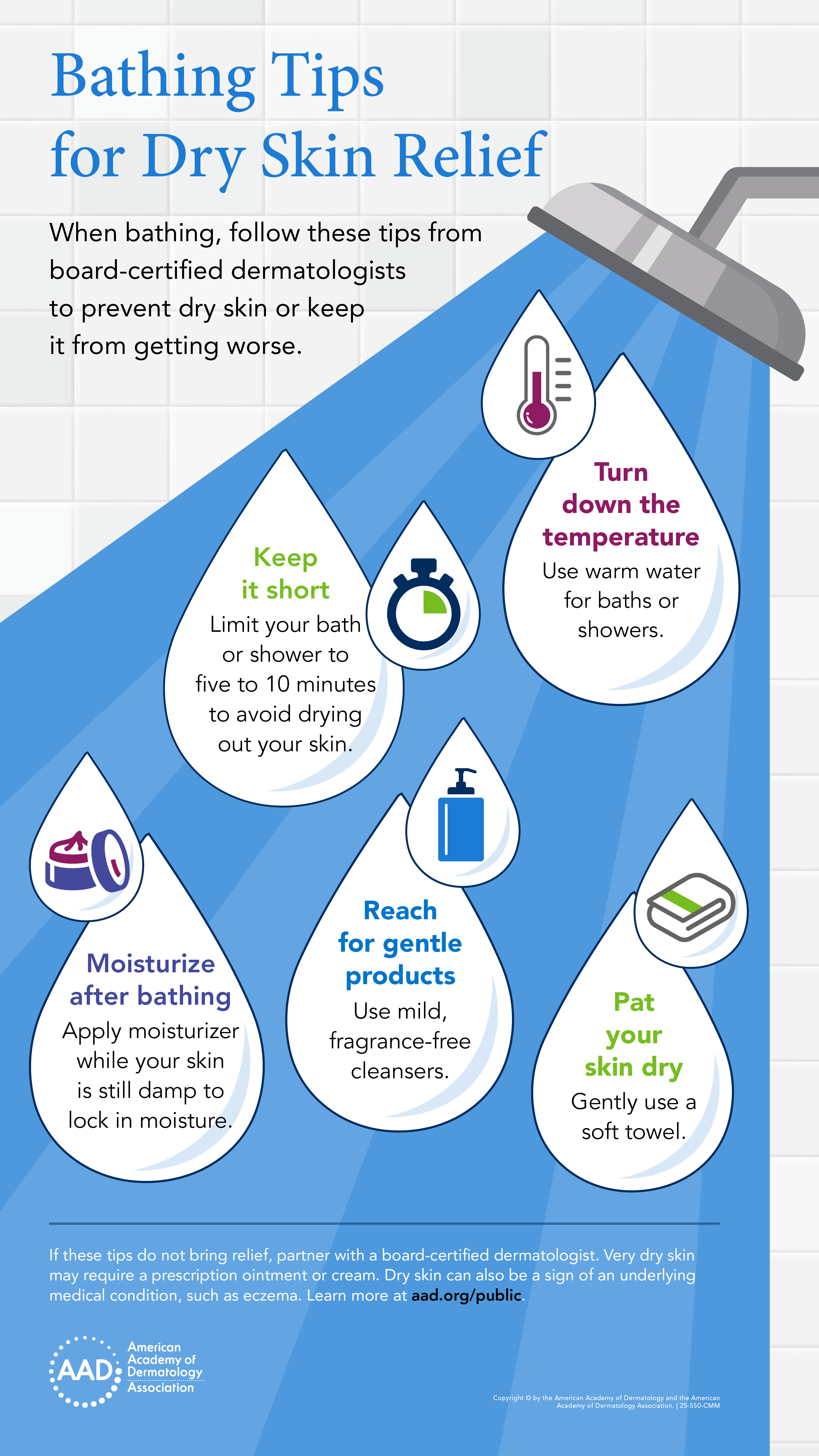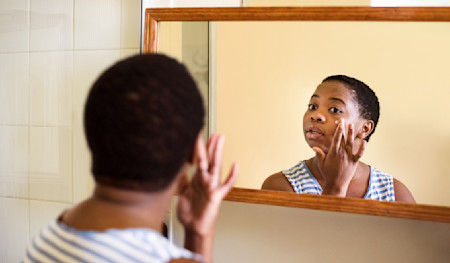Dermatologists' top tips for relieving dry skin
How to treat dry skin: Dermatologist tips for relief
To help relieve dry skin, dermatologists offer these tips.
Dry skin can flake, itch, crack, and even bleed. These tips from board-certified dermatologists can help you heal excessively dry skin at home:
Limit baths and showers to five to ten minutes, using warm water. A short shower or bath in warm water can add moisture to your skin. Close your bathroom door while showering to help hydrate your skin more. To dry off after bathing, gently pat your skin with a clean, dry towel. Rubbing your skin dry can irritate extremely dry skin.
Wash your skin with a gentle cleanser. Dry skin is damaged skin. Apply enough cleanser to remove dirt and oil but avoid using so much that you see a thick lather. Use the cleanser only where you need it, such as your armpits or groin area.
Shave at the end of your shower or bath. The water makes your skin and hair softer and less likely to get irritated by shaving. When you finish your shower or bath, gently pat your skin dry and immediately apply your fragrance-free moisturizer.
Apply moisturizer several times a day. Moisturizer plays a key role in healing dry skin. Be sure to apply your moisturizer when your skin is still damp after taking a shower or bath, after washing your hands, and when your skin feels dry. Take time to gently massage the moisturizer into your skin. To keep dry lips hydrated, apply lip balm or petroleum jelly.
Moisturizer relieves dry skin
To help heal overly dry skin, apply a cream or ointment when your skin feels dry and take time to gently massage the moisturizer into your skin.

Protect your skin from the sun. Apply a broad-spectrum, water-resistant sunscreen with an SPF of 30 or higher, along with seeking shade and wearing sun-protective clothing. Avoid tanning — indoors and out.
Use a humidifier. Dry skin needs moisture. You can boost the humidity level in your home with a humidifier. Some home heating systems have a humidifier. You can also use a portable humidifier. If you use a portable humidifier, place it in your bedroom and run it while you sleep. Clean your humidifier regularly to prevent mold.
Wear gloves. Our hands are often the first place we notice dry skin. If you wash dishes, garden, or immerse your hands in water throughout the day, you can worsen your already dry skin. Wearing gloves that keep your dry skin from getting wet and protected from cold, dry air (like in the winter) can help your skin heal.
Wear loose-fitting cotton clothes. Tight clothes, such as leggings and body-hugging jeans, rub against your skin, which can worsen dry skin. Wearing clothing made of wool or polyester against your skin can also irritate dry, sensitive skin. To prevent irritating your skin, wear loose-fitting cotton clothing and a cotton or silk layer under clothes made of rough fabrics.
Tip
To relieve dry hands, carry a non-greasy hand cream with you and apply it after each hand washing.

What skin care products are best for dry skin?
It’s easy to feel overwhelmed when looking for the best products to relieve your dry skin. With so many products on the market and numerous recommendations coming from advertisements and social media, it can be hard to tell what you should use. The truth is you may already have the product(s) you need at home.
Here’s what dermatologists recommend you look for:
Gentle, fragrance-free skin care products. Some skin care products, such as deodorant soaps, are too harsh for dry, sensitive skin. Dermatologists recommend using products labeled "fragrance-free."
If you see the word "unscented," the product can contain chemicals that neutralize or hide the odors of other ingredients. These chemicals can irritate dry, sensitive skin.Ointment or cream (rather than lotion). Ointments and creams add more moisture to skin and are more effective than lotions. Look for a cream or ointment that contains one or more of the following ingredients:
- Jojoba oil
- Dimethicone
- Glycerin
- Hyaluronic acid
- Lactic acid
- Lanolin
- Mineral oil
- Petrolatum
- Shea butter
Lip balm or petroleum jelly. When choosing a lip balm, pick one that feels good on your lips. If your lips sting or tingle after you apply the lip balm, switch to one that does not cause this reaction.
Ask your dermatologist before using anti-itch creams and other skin care products
Extremely dry skin can itch. To get relief, people often buy an anti-itch cream or other product that promises relief. Before using this, ask your dermatologist. Many of these products contain ingredients that can irritate your overly dry skin, making the dryness and itch worse.
Dry skin? Stop using skin care products that contain any of the following:
Alcohol (except for hand sanitizer)
Fragrance, including deodorant soaps
Retinoids
When should I see a dermatologist for dry skin?
If you continue to have dry skin after trying the top tips that dermatologists recommend, it’s time to see a board-certified dermatologist. Your overly dry skin may be due to an underlying medical condition, such as atopic dermatitis, psoriasis, or kidney disease.
Without treatment for the condition, both your dry skin and the condition can worsen.
Does lotion cause pain?
Does anything you apply to your skin (including moisturizer) cause burning, stinging, or irritation? Tell your dermatologist.

Follow your dry skin treatment plan. If you have excessively dry skin, your skin needs the right balance of active ingredients to heal. Your dermatologist will prescribe (or recommend) a moisturizer that provides what your skin needs. You may also need to apply a medication, such as a corticosteroid, for a short time. If you have an underlying medical condition, such as atopic dermatitis or psoriasis, treating the condition can bring relief. Your dermatologist can create a treatment plan for a skin condition.
Keep all your dermatology appointments. Your treatment plan may need fine-tuning as your skin heals. This is also your opportunity to tell your dermatologist if you have trouble following your treatment plan.
If you need a dermatologist, you can find one by going to: Find a Dermatologist.
Images
Images 1,3: Getty Images
Image 2: Infographic by American Academy of Dermatology
References
Augustin M, Wilsmann-Theis D, et al. “Diagnosis and treatment of xerosis cutis - a position paper.” J Dtsch Dermatol Ges. 2019;17 Suppl 7:3-33.
Terrie YC. “Itchy, scratchy skin: Preventing and managing xerosis.” Pharma Times. Posted 6/18/2013. Last accessed 2/7/2020.
Written by:
Paula Ludmann, MS
Reviewed by:
Sandy Marchese Johnson, MD, FAAD
William Warren Kwan, MD, FAAD
Sanna Ronkainen, MD, FAAD
Desmond Shipp, MD, FAAD
Video reviewed by:
Ata Moshiri, MD, MPH, FAAD
DiAnne Davis, MD, FAAD
Jean Bolognia, MD, FAAD
Michael O’Donoghue, MD, FAAD
Jennifer Adams, MD, FAAD
Darrell S. Rigel, MD, FAAD
Last updated: 1/2/26
 Atopic dermatitis: More FDA-approved treatments
Atopic dermatitis: More FDA-approved treatments
 Biosimilars: 14 FAQs
Biosimilars: 14 FAQs
 How to trim your nails
How to trim your nails
 Relieve uncontrollably itchy skin
Relieve uncontrollably itchy skin
 Fade dark spots
Fade dark spots
 Untreatable razor bumps or acne?
Untreatable razor bumps or acne?
 Tattoo removal
Tattoo removal
 Scar treatment
Scar treatment
 Free materials to help raise skin cancer awareness
Free materials to help raise skin cancer awareness
 Dermatologist-approved lesson plans, activities you can use
Dermatologist-approved lesson plans, activities you can use
 Find a Dermatologist
Find a Dermatologist
 What is a dermatologist?
What is a dermatologist?
